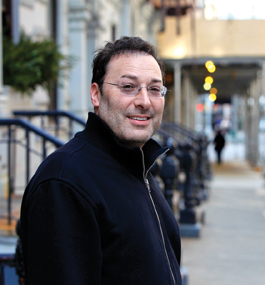Blowing the Whistle on Waste

Photo by Mike Lovett
Dr. Gabriel Feldman ’82
Other than a colorful profile in The New York Times and passing media attention, life has changed little for Dr. Gabriel Feldman ’82 since he collected a multimillion dollar judgment in a whistleblower suit that claimed New York City misspent billions in federal Medicaid funds overpaying for benefits.
And that’s just the way the 50-year-old bachelor wants it.
Feldman has no plans to leave his 275-square-foot Upper West Side apartment for a swanky co-op near Central Park. Nor will he quit his job as a public health physician or embark on a wild spending spree.
“I have always been a minimalist,” he said during a recent interview near his Harlem office. “I have everything I need.”
On Oct. 31, 2011, New York City officials agreed to pay the U.S. Department of Justice $70 million to settle the biggest Medicaid fraud case in the city’s history. For his role in the action, Feldman was awarded $14.7 million, collecting $4.9 million after taxes and legal fees.
But he says his greatest satisfaction comes from knowing he did the right thing.
“At the end of the day, I want to feel I contributed to society,” said the Brooklyn native, whose parents — a Conservative rabbi and a Hebrew-school teacher — instilled in their three sons an uncompromising sense of right and wrong.
Brandeis — both the institution and the university’s namesake — helped further refine his views on how he wanted to lead his life. “Brandeis encouraged me to consider the importance of pursuing social justice,” he said, “and Justice Brandeis embodied a lot of the progressive principles and notions of social equality tempered by reality that I believe in.”
Feldman says he initially identified misuse of funds by a city program serving the elderly and disabled back in the early 1990s while working for a company that reviewed Medicaid cases. He testified before the New York City Council in 1993, but his complaints went nowhere.
“I was told,” he remembered, “‘You might be right, but you might be right at the wrong time in the wrong place.’”
After stints with New York’s Department of Health and Mental Hygiene and the American Cancer Society and briefly owning a kosher barbecue restaurant in Georgia, Feldman returned to his old job in 2006. Finding in place the same wasteful practices — which provided Medicaid recipients with overly generous awards for home health care services like dressing, bathing and feeding — he filed his suit in spring 2009.
Feldman insisted he has not accused program administrators of being immoral or dishonest. Instead, he noted that it was “easier” for them to be generous than to follow regulations. “If you do it the easy way,” he said, “you don’t get angry phone calls from families, politicians and advocacy groups. It was so much easier and quicker to do the wrong thing.”
While some observers have portrayed Feldman as a Scrooge seeking to deny suitable care to the elderly, the U.S. Department of Justice saw it differently. The agency found the program was recklessly spending taxpayer money that could be used to fund other areas of the health-care system.
“If we don’t start to have the discussion about reforming health care, we’re never going to get anywhere,” Feldman said. “As an average citizen, you don’t feel that you have the power to change the system, but you really do. The system is us.”
— David Nathan
